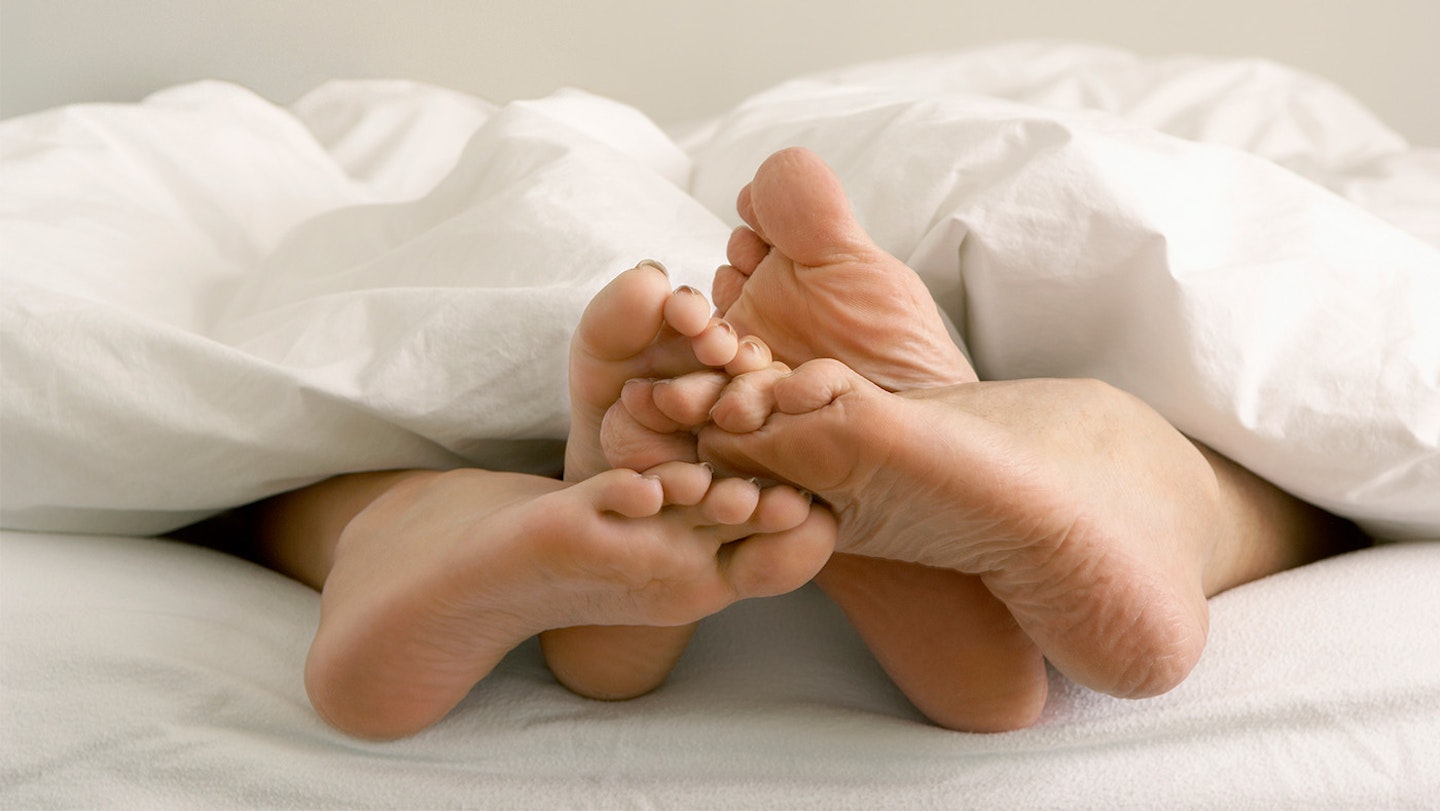While getting intimate is probably the last thing on your mind right now, knowing how long to wait until having sex after having a c-section is important.
Although you might think having sex after a c-section would be easier than sex after a vaginal birth due to less trauma to the vaginal area, it's still common for women who've had a c-section to have struggles in the bedroom. This is especially common in the first few months after giving birth. So if you're finding the idea of intimacy worrying, you're not alone.
If you're wondering how long after a c section you can have sex, we've spoken to expert Midwife Pip to put together a helpful guide. We've included the timeline, risks, recovery tips and things to be aware of before normal bedroom activity resumes.
When can I have sex after a c-section?
Like with every postpartum journey, everyone's body is different and recovers at different rates. Although there's no set rule for all, the general advice is to wait around 6 weeks before having sex after a c-section. After 6 weeks you will have had time to talk to your GP at your 6 week postnatal check up and ask them any questions you might have about sex after a c-section. Of course, all women are different so some women feel ready after a couple of weeks, others will want to wait a couple of months - provided you've had the go-ahead from your GP or health visitor, the decision is yours.
Recovery after a c-section
Whether you've had an elective c-section or natural c-section, it's a good idea to wait until your cervix has closed fully before resuming normal sexual activity. This usually takes around six weeks. During this time, you may find that things like sleeping comfortably and breastfeeding are also difficult. There are many things to consider that will help you to recover after a c-section and ways of sleeping more comfortably after a c-section so you should focus on these before thinking about sex after a cesarean.
Looking after your c-section scar is important, but it's common to still feel discomfort around the scar area after the six-week mark. This may include feelings of numbness and tingling sensations. These feelings are normal, but if you notice they get worse or you develop a fever you should seek help from your GP.
Easing yourself into sex after c-section
Just like the first time you exercise after your c-section, it's normal to feel a little fearful about having sex for the first time after your body has been through childbirth. There is no right or wrong time to wait before having sex after a c-section and everyone’s recovery will be unique to them and their body.
"Many women will choose to wait until they have stopped bleeding and their wound feels comfortable," explains Pip. It's important to take your time, speak to your partner along the way and talk about how you're feeling both physically and mentally towards sex.
Keep in mind that some women experience sexual dysfunction after a c-section. If you are finding sex painful after a c-section or experience bleeding after sex, speak to your GP.
Best positions for sex after a c-section
"Your core and abdomen are likely to feel tender and weak for a while after your c-section so positions where your partner is not placing weight onto you, will likely be most comfortable," says Midwife Pip.
Start by trying some relaxing foreplay. This might involve a massage before trying some sex positions that feel comfortable for you and your body. Sex toys may also be helpful for getting you in the mood. Positions that allow you to control depth and pressure, such as you being on top, will avoid too much pressure on the incision.
"Experimenting and communicating to ensure you feel comfortable is important for sex after a c-section." Sex after c-section is as much about your emotions as your physical state so it's worth making sure you're ready mentally as well as physically.
The importance of lubrication
You may find that you need to use lubrication to help ease things along. "Sleep deprivation coupled with the sudden drop in oestrogen in the postpartum, and during breastfeeding, can reduce libido and contribute to vaginal dryness. It can be useful to communicate with your partner about how you feel about sex and, if needed, to explore other ways to feel close and intimate until you are physically and psychologically ready."

What are the risks of sex after a c-section?
Sex after c-section does come with risks if you rush into it before your body or mind feels ready. If you haven't been signed off by your GP, there's a risk that strenuous activity could cause the wound to open, or lead to pain, bleeding or infection. So if you are unsure whether it is safe for you to resume sex after a caesarean, speak with your GP.
When to see your doctor
You know your body best so it's important to monitor any changes either before you have sex or after you've had sex following a c-section. "If you notice any oozing or redness around your wound, increase in vaginal bleeding, passing of clots or offensive discharge, pain or swelling in your legs, or concerns about your mental wellbeing, it is important to speak with your doctor," Pip recommends.
How to do Kegel exercises after a c-section
As soon as your catheter is removed, you can try to resume pelvic floor exercises such as a Kegels, this should not cause any pain or discomfort. Kegels may also help with sex after a caesarean as they increase the blood flow to the vagina which could increase the pleasure for you and your partner.
"Start doing these in a relaxed seated position around three times a day and aim to increase to standing over the coming weeks or months," says Pip. "Should you experience any leaking or sensation of heaviness it is important to see a pelvic health physiotherapist."
To do a round of Kegels: imagine you are holding in wind and lifting your vagina, aim for 10 squeezes of up to 10 seconds followed by a 10-second relax and then 10 short, sharp squeezes.
Birth control options after a c-section
You can conceive very quickly after having a baby, so contraception is an important consideration. Some options, including the contraceptive implant, IUD, the progesterone-only pill and condoms can be used straight after birth. Other options, including the combined pill can only be started 3 weeks after birth, provided you’re not breastfeeding and have been checked by a GP to ensure you have no risk factors for a blood clot.
"There are options that can be started straight away and others that may require waiting a few weeks, depending on your medical history your doctor will be able to advise on the most appropriate methods," explains Pip.
Sex after c-section
In summary, post c-section sex should wait until:
-
Your incision has healed
-
You've found a method of contraception that suits you and your lifestyle
-
You've been signed off by your doctor
-
You're feeling mentally and physically ready
Once you're ready, take your time, do what feels right for you, keep the communication channels open between you and your partner, and speak to a doctor if you have any concerns.
And according to Dr. Deborah Lee, they say: "A C- section involves cutting through the abdominal wall and the uterus to make a large incision through which the baby is delivered. You might need this instead of a vaginal delivery.
After the C-section, a great deal of muscle, skin and connective tissue needs to heal. It takes 6 - 12 months to recover completely from this type of surgery. Many women are uncertain about when they can resume sex after a C- section. The good news is that there is no set time period. You can do this when you feel ready. However, most women wait for 4 to 6 weeks until their bleeding has stopped and the abdominal wound has healed. Don't feel pressured into having sex too soon. You now have a lot on your hands caring for a new baby. You are bound to feel tired. Also, after childbirth oestrogen levels naturally fall which can result in vaginal dryness. When you have sex, take it slowly and use lots of lubricant, adds Dr. Lee.
Remember you can ovulate as early as 21 days after childbirth so it's advisable to use contraception every time you have sex after the delivery, if you don't want another pregnancy so soon.
Your midwife or GP can advise you about contraception, and many methods can be started immediately after the delivery so you have contraception already on board and functioning ready for when you need it," says Dr. Lee.
About the expert
Having worked for many years in the NHS, mostly as Lead Clinician within an integrated Community Sexual Health Service, Dr Deborah Lee now works as a health and medical writer, with an emphasis on women's health, including medical content for Dr Fox pharmacy. She has published several books and remains passionate about all aspects of medicine and sexual health. After completing her Medical Degree at University of Southampton Medical School in 1986, Dr Lee trained as a GP and after a number of years specialised in Sexual & Reproductive Health (S&RH).
Midwife Pip is a truly passionate midwife and advocate for the profession, bursting with knowledge. Pip is an experienced, practicing Midwifery Sister, MSc graduate, founder of Midwife Pip Podcast, Hypnobirthing and Antenatal Educator, co-author of published research and very importantly, a mum.
Lorna White is the Products Editor for Mother&Baby. After running the Yours magazine website, specialising in content about caring for kids and grandchildren, Lorna brought her expertise to Mother&Baby in 2020. She has a keen interest in a range of topics from potty training and nutrition to baby names and early development and has a wide range of experienced medical experts and professionals at her fingertips. In her spare time, she enjoys spending time with her two young sisters, dog walking and enjoying the outdoors with her family.
